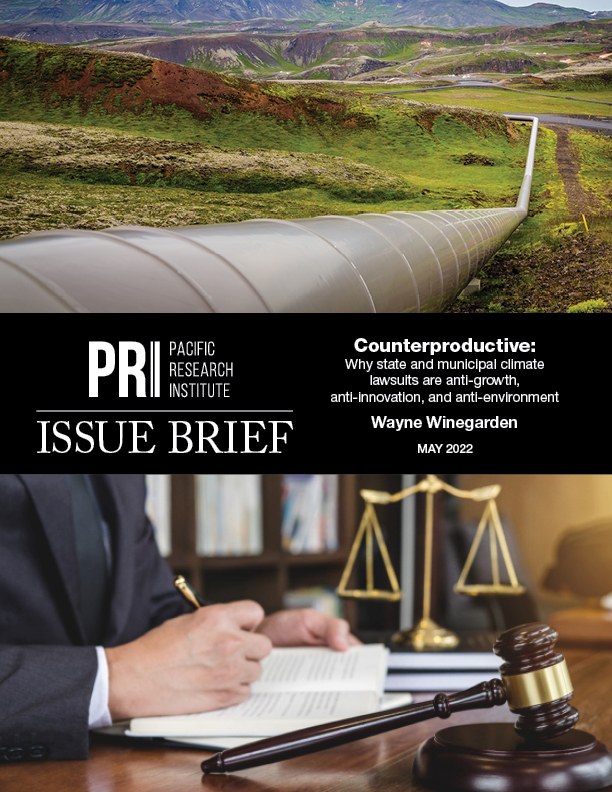SACRAMENTO – City and state climate change lawsuits discourage private sector innovation required to meet America’s clean energy goals – and expensive judgements in these cases can increase gas prices by 31-cents per gallon, finds a new issue brief released today by the nonpartisan Pacific Research Institute.
“Sustainably addressing global climate change requires innovation, but municipal climate change lawsuits actually discourage private sector investment into clean energy innovation,” said Dr. Wayne Winegarden, PRI senior fellow in business and economics and the study’s author. “Expensive judgments could lead to higher prices at a time of record gas prices and inflation.”
State and local governments, including New York City, Baltimore, and several California cities, have sued oil and gas companies claiming that they should be held responsible for alleged damages incurred through climate change.
In “Counterproductive,” Winegarden notes that any judgments assessed in these cases actually hurt consumers and businesses through higher costs for goods and higher gas prices. According to the study’s calculations, every $100 billion in potential judgements in these cases could raise gas prices by 31 cents per gallon – or an additional $326 per household per year.
Winegarden shows that innovation is key to addressing climate change. Municipal lawsuits, he argues, discourage the innovation required to meet the nation’s clean energy goals.
He cites the development of cleaner natural gas technology. The U.S. Energy Information Agency has noted that “the 4 percent decrease in U.S. carbon intensity (over the past two decades) . . . came (in part) from the continuing trend of natural gas and renewables displacing coal for electric power generation.”
However, when future-looking companies and investors see once-heralded low-emission energy sources like natural gas facing the threat of litigation, they are less likely to make future investments in nuclear energy advancements, new battery technology, improved fuel efficiency and other innovations required to continue lowering emissions.
“Pursuing a climate litigation strategy is not the right way for state and local policymakers to address global climate change,” said Winegarden. “Instead of creating new obstacles hindering innovation, state and local leaders should adopt policies creating positive incentives so America’s clean energy potential becomes a reality.”
Instead of inappropriately pursuing policy changes through litigation, Winegarden encourages local and state governments to use the regular legislative process to:
- Provide broad-based, marginal-tax rate reductions for companies developing innovative technologies that reduce Greenhouse gas emissions; and
- Remove policy barriers that handicap the wider use of cleaner natural gas and nuclear power technology that have been proven to produce little or no emissions.


